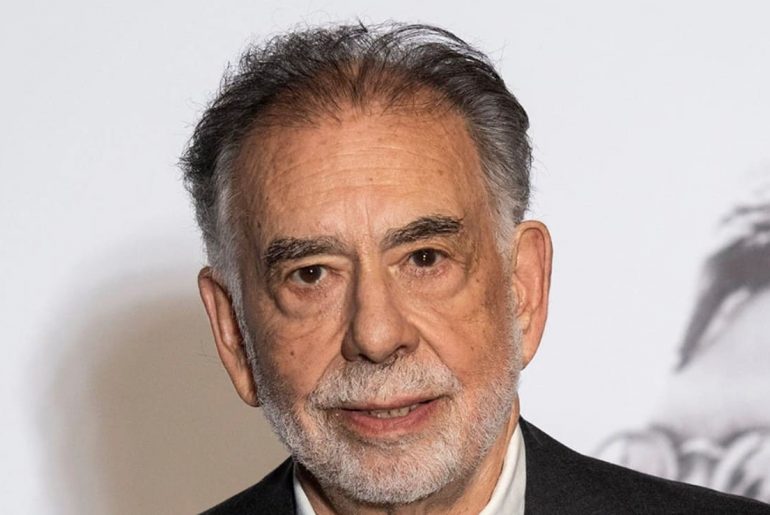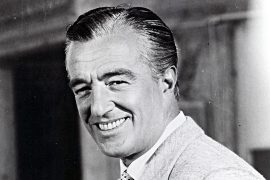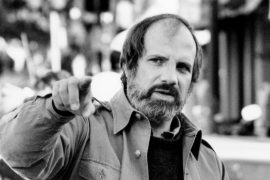The American screenwriter, director, producer and winemaker is one of the most important filmmakers in cinema. A risk-taking and uncompromising creator, Francis Ford Coppola created a unique film style that influenced modern cinema as a whole. His first major production, “Der Pate” from 1972, with which he celebrated his furious breakthrough, was characteristic of his entire oeuvre. Coppola’s unconditional devotion to film is documented by the shooting of the controversial war film “Apocalypse Now”, for which he spent 18 months in the Philippine jungle from 1976 to 1979. Often striving to maintain a critical distance from Hollywood, he produced films such as “Patton”, “The Great Gatsby”, “American Graffiti” or “The Cotton Club”, in which, in addition to commercial success, he did not forgo the depth of content and artistic standards …
Francis Ford Coppola was born on April 7, 1939 in Detroit, Michigan, the son of film composer Carmine Coppola and actress Italia Coppola.
He grew up in California and New York. Confined to a hospital bed as a result of polio, the eight-year-old discovered cinema during the screenings in the hospital. After his recovery, his parents gave him a Super 8 camera. After college, during which time he had already written and directed screenplays, Coppola began studying theater at Hofstra University in New York, from which he graduated in 1958. A year later he took up additional film studies at the University of California in Los Angeles, which he finished in 1968 with the best grade. He made his directorial debut in 1962 with Dementia 13. In 1963 Coppola married stage designer Eleanor Neil, with whom he had three children. Already during his studies, Coppola began to acquire practical experience in the field of film. Under Roger Corman, he continued to learn about directing, working as assistant director, dialogue director, sound engineer, cinematographer and finally director. As with Dementia 13, Coppola also wrote the screenplays for his 1965 films This Property is Condemned and Is Paris Burning? from 1966.
His first success as a director brought him his film about the young generation “You’re a Big Boy Now” from 1966. A year later he directed the successful film musical “Finian’s Rainbow” with Fred Astaire, among others. In his efforts to gain independence from Hollywood, Coppola founded the independent production center “American Zoetrope” in 1969, with which he not only made commercial films but also promoted young talent and later discovered successful directors such as John Milius and George Lucas. His film “The Rain People” was made there in 1969. Coppola received his first Oscar in 1971 for his screenplay for Patton. Forced to do so by financial difficulties, Coppola directed “The Godfather” for Warner Bros. that same year, which brought him international fame. Coppola directed the film as a total work of art. It tells the story of the powerful mafia family around “Vito Corleone”, based on the novel by Mario Puzo, in America in the 1950s.
The stiff became the classic model for an entire genre. The leading roles included Marlon Brando, Al Pacino, Robert Duvall, James Caan and later Robert De Niro, who celebrated their international breakthrough at the same time as Coppola. The work became one of the biggest commercial successes in film history. Production costs of around 7 million US dollars faced 300 million US dollars in box office earnings. The great success was repeated in the continuation of the mafia epic, which was created in 1975 as “The Godfather II” and brought him the second “Oscar”. Meanwhile, Coppola also had commercial success as a producer with the George Lucas-directed films THX 1138 (1971) and American Graffiti (1973). Coppola wrote the screenplay for 1974’s The Great Gatsby, starring Robert Redford, based on the novel by Francis Scott Fitzgerald. Already in 1972 Coppola had founded a directors company with other directors.
Coppola’s unconditional devotion to film is documented by the shooting of the controversial Vietnam War film “Apocalypse Now”, for which he spent 18 months in the Philippine jungle from 1976 to 1979, exposing around 350,000 meters of film, which was then cut to 3,800 meters or two and a half hours. In 1979 Coppola was awarded the “Golden Palm” in Cannes for his impressive directing. In 1981, Francis Ford Coppola produced the risqué film project One with a Heart. The melodrama swallowed up around 25 million US dollars and became a financial fiasco that brought Coppola to the brink of ruin. A little later he founded the film distributor “Cinema 5”. He also worked as a theater manager, book publisher and editor of a cultural magazine. In 1982 Coppola reappeared as producer of the film “Hammett” with Wim Wenders directing. In 1984 he achieved another hit with the public with “The Cotton Club” in the USA and in Europe. This also applied to “The Godfather III”, which received an award at the Berlinale in 1991.
Coppola’s 1991 Dracula film Bram Stoker’s Dracula was well received. Coppola not only wrote the screenplay for the 1997 drama “The Rainmaker” but also directed it. The following year, Francis Ford Coppola produced the drama The Virgin Suicides, which his daughter Sofia directed. In 2010 he was elected to the American Academy of Arts and Sciences. After the film drama “Tetro”, the horror thriller “Twixt”, starring Val Kilmer, Bruce Dern and Elle Fanning, was Coppola’s last major directorial work in cinemas in 2011. In 2013 he received the Praemium Imperiale and in 2015 Coppola was named the Princess of Asturias Prize and the Order of the Star of Italy. Coppola found his passion in viticulture early on. He acquired large acreage in California and became one of the best wine producers in the United States.
Filmography
1963 – “Dementia 13”.
1965 – “This Property Is Condemned”.
1966 – “Is Paris Burning?”.
1967 – “You’re a Big Boy Now”.
1968 – “Finian’s Rainbow”.
1969 – “The Rain People”.
1971 – “Patton”.
1972 – “The Godfather”.
1973 – “American Grafitti”.
1974 – “The Conversation”.
1975 – “The Godfather II”.
1974 – “The Great Gatsby”.
1977 – “The Black Stallion” (Produzent).
1979 – “Apocalypse Now”.
1982 – “One From the Heart”.
1982 – “Hammett” (Produzent).
1982 – “The Escape Artist”.
1983 – “Rumble Fish”.
1983 – “The Outsiders”.
1984 – “The Cotton Club”.
1987 – “Peggy Sue Got Married”.
1987 – “Gardens of Stone”.
1988 – “Life Without Zoe”.
1988 – “Tucker: The Man and His Dream”.
1990 – “The Godfather III”.
1991 – “Bram Stoker’s Dracula”.
1995 – “My Family”.
1995 – “Don Juan De Marco”.
1996 – “Jack”.
1997 – “The Rainmaker”.
1999 – “The Florentine”.
1999 – “The Virgin Suicides”.
2000 – “Grapefruit Moon”.
What is Francis Ford Coppola known for?
Director, producer and screenwriter Francis Ford Coppola is best known for creating ‘The Godfather’ film series starring Marlon Brando and Al Pacino.
Is Nicolas Cage related to Francis Coppola?
Through his father, he is a nephew of director Francis Ford Coppola and of actress Talia Shire, and a cousin of directors Roman Coppola and Sofia Coppola, film producer Gian-Carlo Coppola, and actors Robert and Jason Schwartzman.
What is Francis Ford Coppola most famous movie?
Known primarily for his successful “Godfather” trilogy – “The Godfather” (1972), “The Godfather, Part II” (1974) and “The Godfather, Part III” (1990) – Coppola was the most celebrated of the Young Turks – a group of filmmakers who emerged in the early 1970s that included George Lucas, Steven Spielberg, Martin Scorsese.
How much did Francis Ford Coppola make from The Godfather?
But he hadn’t yet shot a single frame of the movie, and had already alienated himself from the executives. The leads were paid $35,000, while Brando made $50,000 and Coppola himself was paid $110,000.
Why is Coppola so rich?
He has won multiple Academy Awards, both for directing and writing but Coppola is perhaps best known for creating The Godfather movie trilogy. Outside of the film industry, Francis is a highly successful wine entrepreneur and investor.
Is Francis Ford Coppola a billionaire?
Francis Ford Coppola has a net worth of $300 million dollars. He earned his fortune by writing and directing films like The Godfather trilogy, Apocalypse Now, Patton, The Outsiders, and Dracula.





